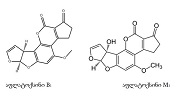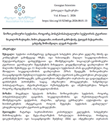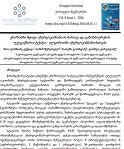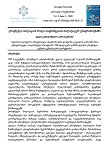Effects of fixation methods on quality parameters of green tea
Downloads
Thermal processes play an extremely important role in the formation of quality indicators of green tea. The main technological process is fixation, which can be carried out by various methods: roasting, steaming, hot air and electrophysical methods. Fixation is essential in green tea processing to inactivate the polyphenol oxidase enzyme. In Georgia, green tea is mainly made from local plant populations using the roasting method. Making green tea is an energy intensive process. The paper presents the results of research on the influence of fixation methods on quality, chemical and safety parameters of green tea. The results of the study of catechins in experimental green tea extracts by high-performance liquid chromatography (HPLC) showed that epigallocatechin gallate is equally present in green tea fixed by electromagnetic induction(Georgian patent 7427 B. 2022) and evaporation, and is superior to the product obtained by the roasting method. The antioxidant activity of tea extracts is in direct correlation with the total amount of polyphenols. According to the results of research, toxic elements: lead (Pb), arsenic (As), cadmium (Cd), mercury (Hg), copper (Cu), as well as: zinc (Zn), manganese (Mn), iron (Fe) absorption spectrometer (AAS 6 000), confirmed the high level of safety of Georgian tea in accordance with established standards.
Downloads
Musial C, Kuban-Jankowska A, Gorska-Ponikowska M., Beneficial Properties of Green Tea Catechins. Int J Mol Sci. 2020 Mar 4;21(5). pii: E1744. doi: 10.3390/ijms21051744.
T. Revishvili, I. Chkhikvishvili, T. Mikadze. Georgian Green speciality Tea. Tne Most Northern Tea Technology. Bulleten Georgian National Academy of Seiences, vol. 15, №1, 2021, p.63-66.
Yuan Haibo, Xu Yongquan, Deng Yuliang, Yin Junfeng※,Wu Rongmei. Optimization of fixation process by electromagnetic heat roller for green tea. Transactions of the Chinese Society of Agricultural Engineering Jan. 2013, 250-258.
Revishvili T., Mikadze T. Chemistry, technology, Tasting amd Equipments in the Tea Industry. Georgian Agrarian University. Tbilisi, 2021, 180 p. (in Georgia).
Peluso I, Serafini M., Antioxidants from black and green tea: from dietary modulation of oxidative stress to pharmacological mechanisms.Br J Pharmacol. 174 (11) (2017) 1195-1208.
Ohishi T, Goto S, Monira P, Isemura M, Nakamura Y., Anti-inflammatory Action of Green Tea. Antiinflamm Antiallergy Agents Med. Chem., 2016; 15(2):74-90. doi: 2174/1871523015666160915154443.
Reygaert WC1., Green Tea Catechins: Their Use in Treating and Preventing Infectious Diseases. Biomed Res Int. 2018 Jul 17;2018:9105261. doi: 10.1155/2018/9105261. eCollection 2018.
Jun Xu , Zhao Xu and Wenming Zheng, Review of the Antiviral Role of Green Tea Catechins Molecules 2017, 22, 1337; doi:10.3390/molecules22081337.
Musial C, Kuban-Jankowska A, Gorska-Ponikowska M., Beneficial Properties of Green Tea Catechins. Int J Mol Sci. 2020 Mar 4;21(5). pii: E1744. doi: 10.3390/ijms21051744.
Green tea effects on cognition, mood and human brain function: A systematic review. Mancini E, Beglinger C, Drewe J, Zanchi D, Lang UE, Borgwardt S.Phytomedicine. 2017 Oct 12;34:26-37. doi: 10.1016/j.phymed.2017.07.008. Epub 2017 Jul 27. Review.
Khalesi S, Sun J, Buys N, Jamshidi A, Nikbakht-Nasrabadi E, Khosravi-Boroujeni H., Green tea catechins and blood pressure: a systematic review and meta-analysis of randomised controlled trials. Eur J Nutr.,53(6) (2014) 1299-311. doi: 10.1007/s00394-014-0720-1. Epub 2014 May 27.
Momose Y, Maeda-Yamamoto M, Nabetani H., Systematic review of green tea epigallocatechin gallate in reducing low-density lipoprotein cholesterol levels of humans. Int J Food Sci Nutr., 67(6) (2016) 606-13. doi: 10.1080/09637486.2016.1196655. Epub 2016 Jun 20.
Cicero AFG, Colletti A., Polyphenols Effect on Circulating Lipids and Lipoproteins: From Biochemistry to Clinical Evidence. Curr Pharm Des. 2018;24(2):178-190. doi: 10.2174/1381612824666171128110408.
Kim SN, Kwon HJ, Akindehin S, Jeong HW, Lee YH., Effects of Epigallocatechin-3-Gallate on Autophagic Lipolysis in Adipocytes, Nutrients, 30, 9(7) (2017). pii: E680. doi: 10.3390/nu9070680.
Vázquez Cisneros LC1, López-Uriarte P, López-Espinoza A, Navarro Meza M, Espinoza-Gallardo AC, Guzmán Aburto MB., Effects of green tea and its epigallocatechin (EGCG) content on body weight and fat mass in humans: a systematic review. Nutr Hosp., 5;34(3) (2017) 731-737. doi: 10.20960/nh.753.[Article in Spanish; Abstract available in Spanish from the publisher].
Jian Zhang, Ruidong Yang, Rong Chen,Yishu Peng, Xuefeng Wen and Lei Gao.
Accumulation of Heavy Metals in Tea Leaves and Potential Health Risk Assessment: A Case Study from Puan County, Guizhou Province, China. Int J Environ Res Public Health. 2018 Jan; 15 (1): 133.Published online 2018 Jan 13. doi: 10.3390/ijerph15010133
B. Dolidze, T. Revishvili, Z. Andghulade, A. Gamakharia, Z. Papidze, D. Rokva, M. Tskhvaradze. Tea fixing machine. Georgian patent 7427 B. 2022.
Revishvili T., Dolidze B., Andguladze Z., E. Gobronidze E., Zhvania L. New Energy-saving Technology of Green Tea. Bulleten Georgian National Academy of Seiences, vol. 17, №4, 2023, 111 – 117.
I. Choladze, T. Revishvili, B. Dolidze, S. Guruli, Z. Andguladze, M. Choladze, Tea leaf fixing machineGeorgian patent 4930 B, 2010.
ISO 1574. Tea. Determination of water extract. 1980.
ISO 14502-1. Determination of substances characteristic of green and black tea-Part1:
Content of total polyphenols in tea —Colorimetric method using Folin-Ciocalteu reagent, 2005.
ISO 14502-2. ,Determination of substances characteristic of green and black tea-Part 2: Content of catechins in green tea - Method using high-performance liquid chromatography, 2005.
Kupina S, Fields C, Roman MC, Brunelle SL. Determination of Total Phenolic Content Using the Folin-C Assay: Single-Laboratory Validation, First Action 2017.13.J AOAC Int., 1;101(5) (2018) 1466-1472. doi: 10.5740/jaoacint.18-0031. Epub 2018 Jun 12.
I.Chkhikvishvili, T. Revishvili, D. Apkhazava, N. Gogia, M. Esaishvili,D. Chkhikvishvili. Catechins and antioxidant activity of tea products. Annals Agrarian Seience, vol.19, #1, 2021, 39-45.
R. Jinjolia, K. Gulua, N. Chikovani. Tea Chemistry Practicum.“Ganatleba”. bilisi, 1983.160 p (in Georgia).
Ekissi Alice Christine, Yao-Kouamé Albert, Kati-Coulibaly Séraphin. Determination of the Minerals of theHerbal Tea and Tea Green fromLippia. multiflora. American Journal of Plant Sciences, 2017, 8, 2608-2621http://www.scirp.org/journal/ajps
Copyright (c) 2024 Georgian Scientists

This work is licensed under a Creative Commons Attribution-NonCommercial-NoDerivatives 4.0 International License.


























































































































































































































